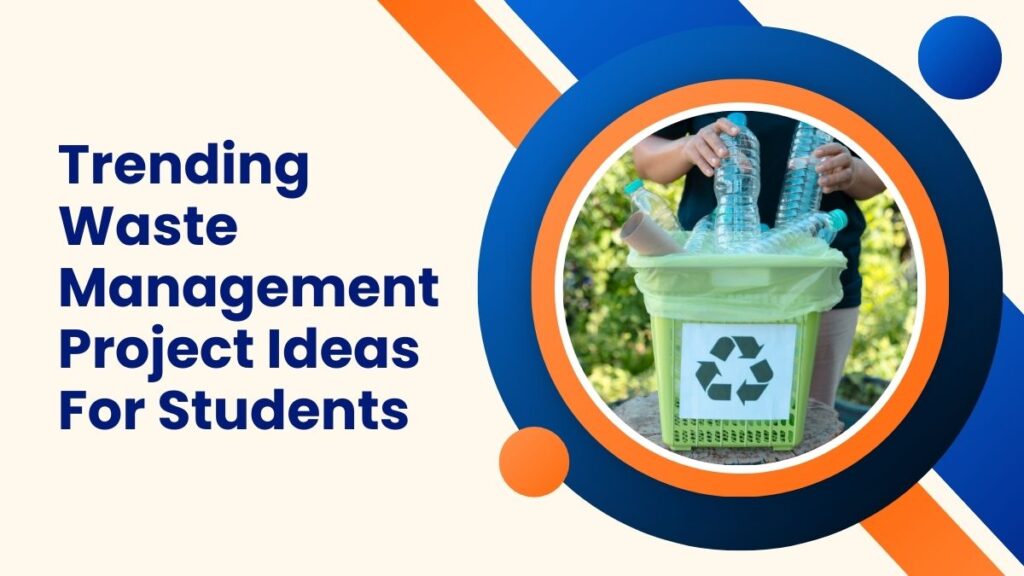Discover innovative waste management project ideas that promote sustainability and environmental responsibility. Explore practical solutions for reducing waste, recycling, and improving community practices to create a cleaner, greener future!
Have you ever wondered how much waste we produce daily and how it impacts our environment? As students, you have the power to make a difference in waste management practices through innovative projects that promote sustainability and environmental awareness.
With increasing global concerns about pollution and waste disposal, exploring waste management solutions is not just timely; it’s essential.
This article presents over 147 trending waste management project ideas that can ignite your creativity while contributing positively to your community. From recycling initiatives to innovative composting methods, these projects provide a hands-on approach to learning about waste management and environmental stewardship.
Whether you’re working individually or in groups, these ideas will help you engage with the pressing issue of waste and inspire action. Let’s dive in and explore how you can transform waste into valuable resources through these exciting project ideas!
Waste Management Project Ideas PDF
147+ Waste Management Project Ideas For Students
These are the list of most interesting waste management project ideas for students:
Recycling Initiatives
- School Recycling Program
- Plastic Bottle Art Installation
- E-Waste Collection Drive
- DIY Recycling Bins for Classrooms
- Recycling Awareness Campaign
- Community Recycling Workshops
- Recyclable Material Hunt
- Recycling Relay Race
- Create a Recycling Guidebook
- Host a Recycling Fair
Composting Projects
- Composting at School
- Worm Composting (Vermicomposting)
- DIY Compost Bin
- Compost Tea Experiment
- Bokashi Composting Workshop
- Community Composting Initiative
- Composting Workshops for Parents
- Use Compost in School Gardens
- Analyze Compost’s Impact on Plants
- Documenting the Composting Process
Waste Reduction Strategies
- Zero-Waste Lunch Challenge
- Digital Note-Taking Campaign
- Reusable Bag Initiative
- Upcycling Workshop
- Plastic-Free Day Celebration
- Food Waste Awareness Campaign
- Promote Bulk Buying to Reduce Packaging
- DIY Reusable Sandwich Wraps
- Encourage Carpooling to Reduce Waste
- Organize a Clothes Swap
Community Engagement
- Neighborhood Clean-Up Event
- Trash Art Contest
- Waste Management Awareness Day
- Partner with Local Businesses for Sustainability
- Community Garden Using Recycled Materials
- Host a Waste Management Forum
- Develop a Waste Reduction Pledge
- Create a Local Eco-Map Highlighting Green Spaces
- Organize Eco-Friendly Festivals
- Collaborate with NGOs for Environmental Awareness
Educational Campaigns
- Infographic Creation on Waste Statistics
- Social Media Awareness Challenge
- Documenting Local Waste Issues
- Create Educational Videos on Recycling
- Waste Management Workshops for Students
- School Newspaper Column on Waste Reduction
- Create a Podcast on Environmental Issues
- Host Debates on Waste Management Policies
- Develop a Waste Reduction Curriculum
- Produce a Short Film on Waste Problems
Innovative Technologies
- Waste Sorting App Development
- DIY Solar-Powered Trash Compactor
- 3D Printing with Recycled Plastic
- Smart Trash Bin Prototype
- Waste Audit using Technology
- Research on Waste-to-Energy Technologies
- Develop a Recycling Game App
- Create a Virtual Reality Experience on Waste Issues
- Analyze the Impact of Different Recycling Methods
- Study the Lifecycle of Recyclable Materials
Research Projects
- Waste Composition Study at School
- Investigate Effects of Landfills on Local Environment
- Research Solutions to Plastic Pollution
- Explore Cultural Practices in Waste Management
- Study Community Recycling Rates
- Assess Environmental Impact of Local Waste Policies
- Analyze Waste Management Systems in Different Countries
- Research on Microplastics in Local Water Bodies
- Investigate Food Waste in Cafeterias
- Study the Impact of Waste on Wildlife
Practical Applications
- Food Waste Recipe Book Compilation
- DIY Biodegradable Containers
- Seed Bombs for Reforestation
- Eco-Friendly Packaging Solutions
- Build Furniture from Reclaimed Wood
- Create Natural Cleaning Products from Waste
- Organize a Workshop on Making Eco-Friendly Crafts
- Develop Reusable Grocery Bags from Old T-Shirts
- Create Bath Products from Recycled Materials
- Set Up a Local Repair Café
Art and Awareness
- Mural on Waste Management Issues
- Photography Exhibition on Local Waste Problems
- Performance Art Highlighting Waste Issues
- Trash Sculpture Gallery
- Create an Awareness Billboard
- Host a Talent Show with Environmental Themes
- Eco-Play with Waste Management Message
- Design Eco-Friendly Merchandise for Fundraising
- Organize a Community Art Project with Recycled Materials
- Create a Collage from Local Waste Materials
School Initiatives
- Form an Environmental Club
- Organize an Environmental Science Fair
- Host a Guest Speaker Series
- Implement a Green Policy in School
- Develop a School Garden with Compost
- Collaborate with Other Schools for Eco Projects
- Create an Eco-Friendly School Calendar
- Start a School-wide Challenge to Reduce Waste
- Conduct Surveys on Waste Awareness in School
- Set Up a Green Committee to Oversee Initiatives
Behavioral Change Initiatives
- Pledge for Reducing Single-Use Plastics
- Weekly Tips on Waste Reduction
- Create a Challenge for Students to Reduce Waste
- Engage in a “No Waste Week” Event
- Promote Green Choices in Cafeteria
- Set up a Reward System for Recycling Efforts
- Develop a Peer Mentorship Program on Waste Management
- Conduct Interviews on Waste Perceptions
- Host Family Engagement Events on Waste Issues
- Create a Pledge Wall for Waste Reduction
Local Policy Engagement
- Research Local Waste Management Policies
- Advocate for Better Recycling Facilities
- Organize Meetings with Local Officials
- Develop a Proposal for Improved Waste Management
- Campaign for Banning Single-Use Plastics
- Engage in Community Meetings on Waste Issues
- Create a Policy Proposal for School Waste Reduction
- Partner with Local Government on Clean-Up Initiatives
- Develop Awareness Campaigns on Local Policies
- Create a Local Waste Management Report
Sustainable Practices
- Research Sustainable Farming Techniques
- Promote Organic Gardening
- Create a Guide for Sustainable Living
- Organize Workshops on Organic Waste Management
- Analyze Sustainable Materials for Packaging
- Study Alternatives to Plastic in Packaging
- Promote Urban Gardening and Composting
- Advocate for Community Supported Agriculture (CSA)
- Create a Local Sustainability Directory
- Develop a Guide for Eco-Friendly Home Practices
Digital and Social Media Projects
- Create a YouTube Channel on Waste Issues
- Develop a Blog on Waste Management Practices
- Host Online Webinars on Environmental Education
- Create Digital Art Projects to Promote Awareness
- Utilize TikTok for Quick Waste Management Tips
- Organize Instagram Challenges for Eco-Friendly Actions
- Start a Facebook Group for Local Waste Initiatives
- Develop Infographics for Social Media Sharing
- Create Memes to Spread Awareness Humorously
- Document Waste Issues in a Video Diary
Global Awareness and Advocacy
- Participate in Global Clean-Up Days
- Join International Environmental Campaigns
- Collaborate with Global Organizations on Waste Issues
- Research Global Waste Management Strategies
- Host a Model United Nations on Waste Management
- Write Letters to Officials Advocating for Change
- Partner with NGOs for Global Awareness Projects
- Organize Cultural Exchange on Waste Management Practices
- Study International Waste Reduction Success Stories
- Advocate for Global Policies on Plastic Reduction
Recycling Initiatives
- School Recycling Program: Set up recycling bins and educate peers on what can be recycled.
- Plastic Bottle Art: Create art installations from recycled plastic bottles.
- E-Waste Collection Drive: Organize a drive for collecting electronic waste.
- DIY Recycling Bins: Create labeled bins for different recyclable materials.
- Recycling Awareness Campaign: Launch a campaign to promote recycling habits among students.
Composting Projects
- Composting at School: Start a composting initiative for food waste in the cafeteria.
- Worm Composting: Create a worm bin to demonstrate vermicomposting.
- Compost Tea Experiment: Test the effectiveness of compost tea on plant growth.
- Bokashi Composting: Explore this fermentation method of composting.
- Composting Workshops: Organize workshops to teach others about composting.
Waste Reduction Strategies
- Zero-Waste Lunch Challenge: Encourage students to bring waste-free lunches for a week.
- Digital Notes: Promote the use of digital note-taking to reduce paper waste.
- Refillable Station: Set up a station for students to refill water bottles.
- Upcycling Projects: Host a workshop on upcycling items like old clothing or furniture.
- Plastic-Free Day: Designate a day to raise awareness about reducing plastic use.
Community Engagement
- Neighborhood Clean-Up: Organize a community clean-up event in local parks.
- Waste Management Awareness Day: Host an event to educate the community about waste management.
- Recycling Art Contest: Encourage local artists to create art from recycled materials.
- Eco-Friendly Business Partnerships: Collaborate with local businesses for sustainable practices.
- Garden Recycling Program: Create a community garden that uses compost and recycled materials.
Educational Campaigns
- Infographic Creation: Design infographics about waste statistics and tips for reduction.
- Social Media Awareness: Use social media to spread the word about waste management issues.
- Documentary Project: Create a documentary showcasing local waste issues.
- Waste Management Workshops: Offer workshops on proper waste disposal methods.
- School Newspaper Column: Write a column on waste management in the school newspaper.
Innovative Technologies
- Waste Sorting App: Develop an app that helps users identify recyclable items.
- DIY Solar-Powered Compactor: Build a solar-powered trash compactor.
- 3D Printing with Recycled Plastic: Explore 3D printing using recycled materials.
- Waste Audit Project: Conduct an audit of school waste to identify reduction opportunities.
- Smart Trash Bins: Create a prototype for a smart bin that alerts when full.
Research Projects
- Waste Composition Study: Analyze the types of waste generated at school.
- Effects of Landfills: Research the environmental impacts of local landfills.
- Plastic Pollution Solutions: Investigate innovative solutions to plastic pollution.
- Cultural Practices in Waste Management: Study different cultures’ approaches to waste.
- Waste-to-Energy Technologies: Research technologies that convert waste to energy.
Practical Applications
- Food Waste Recipe Book: Compile recipes that utilize food scraps.
- DIY Biodegradable Containers: Create containers from natural materials.
- Seed Bombs for Reforestation: Make seed bombs from recycled paper for planting.
- Eco-Friendly Packaging Solutions: Design packaging alternatives using waste materials.
- Recycled Furniture Project: Build functional furniture from reclaimed wood or pallets.
Art and Awareness
- Mural on Waste Issues: Create a mural addressing waste management topics.
- Photo Exhibition: Document waste issues in your community through photography.
- Performance Art: Develop a performance that highlights the importance of waste reduction.
- Art Installation with Found Objects: Use trash to create meaningful art installations.
- Educational Theatre: Write and perform a play about waste management.
School Initiatives
- Green Club: Form a club focused on sustainability and waste reduction.
- Environmental Science Fair: Include waste management as a category for projects.
- Sustainability Week: Organize a week dedicated to sustainability education.
- Guest Speaker Series: Invite experts to speak about waste management.
- Waste Management Curriculum: Propose the inclusion of waste management in the school curriculum.
How Do I Create A Waste Management Project?
- Define Your Objectives: Identify the specific goals of your project (e.g., reducing waste, promoting recycling).
- Research: Gather information about waste management practices, regulations, and existing initiatives in your area.
- Choose a Focus Area: Decide whether to focus on education, recycling, waste reduction, or community involvement.
- Plan Your Approach: Outline the steps you will take, the timeline, and the resources needed.
- Engage Stakeholders: Involve students, faculty, community members, and local businesses in your project.
- Implement the Project: Execute your plan, monitor progress, and make adjustments as necessary.
- Evaluate and Report: Assess the outcomes of your project and share findings with stakeholders.
Waste Management Project Ideas for Students in 2025
- Campus Recycling Initiative: Set up recycling bins around the campus and promote their use through educational campaigns.
- Waste Audit: Conduct an audit of waste generated on campus to identify key areas for improvement.
- Community Clean-Up: Organize a community event to clean up local parks or neighborhoods.
- Composting Program: Start a composting initiative to reduce food waste from cafeterias.
- Awareness Campaign: Create posters, social media posts, and workshops to educate students about waste management.
Waste Management Project Ideas for Engineering Students
- Innovative Waste Collection Systems: Design and prototype an efficient waste collection system using IoT.
- Waste-to-Energy Solutions: Research and propose methods for converting waste into energy.
- Sustainable Material Alternatives: Develop new materials that can replace conventional plastics.
- Smart Recycling Bins: Create bins that use sensors to inform users about recycling best practices.
- Water Filtration Systems: Design systems to clean wastewater for reuse.
Waste Management Project Ideas for College Students
- Sustainable Event Planning: Implement waste reduction strategies for college events (e.g., zero-waste festivals).
- Repair and Reuse Workshops: Organize workshops to teach skills for repairing items instead of discarding them.
- Student-led Recycling Teams: Form teams to monitor and promote recycling efforts on campus.
- Digital Platforms for Sharing Resources: Create an online platform for students to share or donate items they no longer need.
- Waste Reduction Challenges: Initiate challenges to encourage students to reduce their personal waste.
Waste Management Project Ideas for School
- Reduce, Reuse, Recycle Campaign: Launch a campaign focusing on the 3Rs.
- Eco-Clubs: Establish clubs dedicated to environmental awareness and waste management.
- Recycling Competitions: Organize friendly competitions between classes to see who can recycle the most.
- Waste Management Education: Develop lesson plans that teach students about the importance of waste management.
- School Garden Project: Create a garden that utilizes compost from school lunches.
What Are the 5 R’s of Waste Management?
- Refuse: Say no to unnecessary items and packaging.
- Reduce: Minimize waste by consuming less and making sustainable choices.
- Reuse: Use items multiple times before discarding them.
- Recycle: Process materials to create new products.
- Rot: Compost organic waste to enrich the soil.
Case Studies of Successful Waste Management Projects
- San Francisco Zero Waste Goal: Explore how San Francisco implemented comprehensive recycling and composting programs, aiming for zero waste by 2030.
- The 5Rs Initiative in Japan: Analyze how Japan promotes the 5Rs to achieve a sustainable society.
- Community Composting in Seattle: Review Seattle’s efforts to increase composting through community engagement and education.
- Recycling Program in Germany: Study Germany’s successful dual system for packaging recycling, which involves producers and consumers.
- University of Florida’s Waste Diversion: Investigate how the University of Florida has increased its recycling rates and reduced waste through various initiatives.
Final Thoughts
Embarking on waste management projects not only enriches your learning experience but also empowers you to make a tangible impact on your community and the environment. By choosing any of these 147 trending ideas, you can contribute to raising awareness about waste reduction, recycling, and sustainable practices.
These projects encourage creativity, critical thinking, and collaboration, all essential skills for today’s global challenges. Remember, every small action counts in the fight against waste and pollution. As you engage with these projects, consider sharing your results and insights with your peers, educators, and the broader community. Together, we can foster a culture of sustainability and inspire others to take part in this vital movement. Let’s turn our ideas into action and pave the way for a cleaner, greener future!
Frequently Asked Questions
Meet Tom Latham from Good Project Ideas! He’s passionate about sparking creativity and making learning fun for all. Tom loves crafting engaging projects that inspire curiosity and hands-on exploration. Join him in bringing ideas to life!



